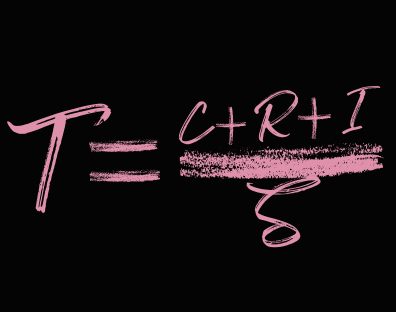The Arithmetic of the Job Search: Balancing the Trust Equation
10.20.2021 | Blog

Hello again, everyone!
After writing my last article about job and recruitment scams, I have been thinking about how much trust is involved in what I do as a recruiter. After finding a candidate’s resume, I cold call them and begin talking about potential opportunities for their future. They don’t know me, so I need to build a rapport, or relationship, to effectively collaborate with them for both getting them work and filling my client’s positions. However, this is the same for a fraudster seeking to take the unsuspecting jobseeker’s money, information, or even identity. In this article, I want to teach you what it means to trust someone contacting you out of the blue, and how to notice when someone is not looking out for you.
First, I want to show you this equation:

(Above image created by Bond Consultants Group, Inc.)
Above, is the Trust Equation, a method of figuring out how Trustworthy a person is by considering their Credibility, Reliability, and Intimacy then factoring in their Self-orientation. All of these qualities, are weighted based on our interaction with a person, and this equation can be applied to both personal and business relationships.
**Reference: Understanding The trust Equation, by TrustedAdvisor Associates, LLC
Credibility is shown by how believable or plausible a person’s knowledge on a certain subject is. For example, as a recruiter, I try to demonstrate my general knowledge of what my clients can offer candidates in terms of pay, benefits, and career advancement. Even if I don’t know the exact numbers involved, I can (and should) be honest about what I do and don’t know and show candidates that I am willing to find out, within reason. Scammers rely on job seekers being uninformed about the facts of the job market and what their fake opportunities can offer their victims while having a literal answer for everything asked.
What an individual actually accomplishes for you demonstrates their Reliability. A recruiter’s job is to connect the potential of candidates with opportunities of clients. I get to know candidates, introduce them to my client, and be the middleman for all parts of the interview and hiring process. You can rely on me to keep you posted and at least try find out any information about the position that you are applying for, free of charge. In contrast, the charlatans of the internet don’t actually do anything for their marks. They quickly try to get money and information, while pretending to help with terms like “expedition fees”, “processing and admin fees”. By receiving personal and financial information with little to no interaction with their victims, they only seek to take advantage, with no regard to the job seeker’s wellbeing.
Good recruiters try to take a professional interest in the candidates they contact while letting them know that their information is protected and their situations are respected. This is how recruiters get Intimacy, a feeling closeness, with jobseekers. Sometimes, there are intense and deep personal reasons for not finishing school, quitting a job after a short period of time, and having gaps in employment. While these things can be explained to clients, I will not tell anything that the candidate does not want me to. You can trust me to keep your private life private. Modern day scammers do not truly care about your personal live or any form of intimacy with you. Rather, the intimacy they offer is more one sided, often using tricks to get you to are helping them. If they do present as wanting to help the job seeker, it is a very shallow help with little to no actual depth of the relationship.
This leads to the final variable in the trust equation, Self-orientation. Generally, this refers to the motivation of a person for their actions—being credible, reliable, and intimate—which can either be for themselves or for you. My focus as a recruiter is towards others. I professionally do what I can to help my clients fill their openings and my candidates (hopefully you!) be the ones to fill those openings. However, scammers are only out for themselves in one way or another.
Now that you understand a little bit more about recruitment and trust, I will take this chance to show you my trustworthiness and tell you a story of when I was scammed. Hopefully, this will show you how credible, reliable, and intimate I am while proving my orientation towards you, the reader and possible job seeker.
I was 30 years old and had just come back from teaching English overseas. I was looking to start life back up in the US, so one of my first moves was to buy a car. I found an ad on Craigslist for a car that was really cheap for how new it was. I exchanged a few messages with the poster. They told me they needed to get rid of the car due to the death of the person who owned it, sent me a fake invoice from eBay, and had me pay for the nonexistent vehicle with eBay gift cards. Long story short, I was conned out of $2,500.
While not related directly to the topic of job searching, this shows how easily it was for me to be scammed while using the internet to search for something . I thought the person on the other end of the email exchange was trustworthy. They seemed credible as they walked me through how to “purchase” the vehicle from them. They showed themselves as reliable by promptly replying to my emails. And the fact they shared personal stories with me gave me a sense of intimacy. However, their self-orientation was completely for their own gain.
As I said at the beginning of this article, trust is key to my work as a recruiter and part of my job is to build relationships with both my clients and the candidates I cold contact. In terms of the job search, scammers use similar approaches that we recruiters do to gain and exploit the trust of unsuspecting jobseekers. If you are seeking a new position and are contacted by someone, I suggest that you keep the trust equation in mind. Consider what the person is offering to you, what they are asking of you, and what their ultimate motivation seems to be for contacting and attempting to build trust with you. Are they credible? Do they seem reliable? How are they becoming intimate? How high is their self-orientation? Figuring these out when initially contacted is key to avoiding job and recruitment scams. This is not only good for the jobseekers but also for the (actual) recruiters whom are trying to connect with and help them.
The truth is that the prevalence of scams involving cold calling has made the job of recruiters all the harder. There are times when I contact someone after finding a resume that they either posted on a job board site or submitted to one of my positions, only to be either hung up on immediately after saying hello or even directly accused of being a scammer. It is my hope that this article will be a good insight for jobseekers into how trust works and prevent the preemptive turn down of the REAL opportunities that recruiters seek to connect them with.
Thank you so much for reading!
Further Reading
- Job Scams: Warning Signs and How to Avoid Them This article from Job Hunt goes more in depth on common online job scams and what to look out for while job searching.
- 12 Tricks Con Artists Use to Win Your Trust This interesting piece by Readers Digest explains how con artists operate to get the trust of their marks. Online job scammers use many of these same tactics.
- SCAM YOU WORK THEM OUT? The Sun offers this article about common tips for noticing and avoiding getting taken advantage of by phone scammers.
Links
- Bond Consultants Facebook
- Bond Consultants LinkedIn
- Jeremy’s LinkedIn
- Image by Gerd Altmann via Pixabay